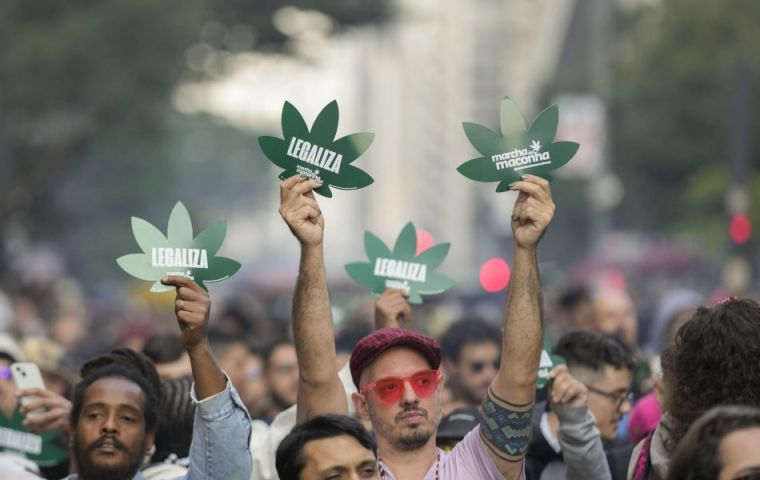MercoPress. South Atlantic News Agency
Brazil's STF sets 40 grams of marijuana cap between users and traffickers
 Barroso said the STF should set the amount because decisions concerning people's freedom were to be made and a criterion was needed
Barroso said the STF should set the amount because decisions concerning people's freedom were to be made and a criterion was needed Brazil's Supreme Federal Court (STF) ruled Wednesday that 40 grams of marijuana or six female plants of Cannabis sativa was the limit marking the difference between personal consumption and trafficking, Agencia Brasil reported. The understanding was reached after a decision the previous day whereby using the substance for personal recreation or medicinal purposes should not be penalized. At the time, most justices concurred on this issue but disagreed on how to differentiate the two possibilities.
The calculation was based on the votes of the justices who set the amount between 25 and 60 grams in the votes in favor of decriminalization. Based on an average of the suggestions, the amount of 40 grams was set.
Nevertheless, marijuana smoking remained illegal in public places, but possession became only an administrative offense.
The STF's decision does not prevent police approaches, and the drug can be seized by officers. In these cases, the police will have to notify the user to appear in court.
The Supreme Court ruled on the constitutionality of Article 28 of the Drug Law (Law 11.343/2006). In order to differentiate between users and dealers, the law provides for alternative sentences of community service, a warning about the effects of drugs, and compulsory attendance at an educational course.
The law no longer provides for prison sentences but maintains criminalization. As a result, drug users are still the target of police investigations and legal proceedings seeking to enforce alternative sentences.
With the decision, the STF upheld the law but understood that the consequences were administrative, and the possibility of community service was no longer valid. The warning and compulsory attendance at an educational course are maintained and will have to be applied by the courts in administrative proceedings, with no criminal repercussions.
A record of repeat criminal offenses cannot be assessed against users either, Agencia Brasil also explained.
During the session, STF Chief Justice Luís Roberto Barroso refuted allegations of an invasion of jurisdiction to judge decriminalization after Senate Speaker Rodrigo Pacheco argued that it was up to Congress to settle the matter.
Barroso said that the STF should decide the case because it receives and judges prisoners' habeas corpus. “This is typically a matter for the Judiciary. We need to have a criterion to define whether a person should be imprisoned or not, that is, whether we are going to have a dramatic impact on a person's life or not. There is no more important role for the judiciary than to decide whether a person should be imprisoned or not,” he said.
As per the ruling, users can be taken to a police station when they are approached by the police carrying marijuana. It will be up to the police officer to weigh the drug, check whether the situation qualifies as a possession for personal use, and refer the case to the courts.
The new rules for users will be valid until Congress approves new regulations on the subject.
The STF's decision also allows arrests for drug trafficking in cases where the amount of marijuana is less than 40 grams. In these cases, police will have to take into account evidence of the drug being sold, the seizure of a scale to weigh the narcotics, and records of sales and contacts between dealers.




Top Comments
Disclaimer & comment rulesCommenting for this story is now closed.
If you have a Facebook account, become a fan and comment on our Facebook Page!